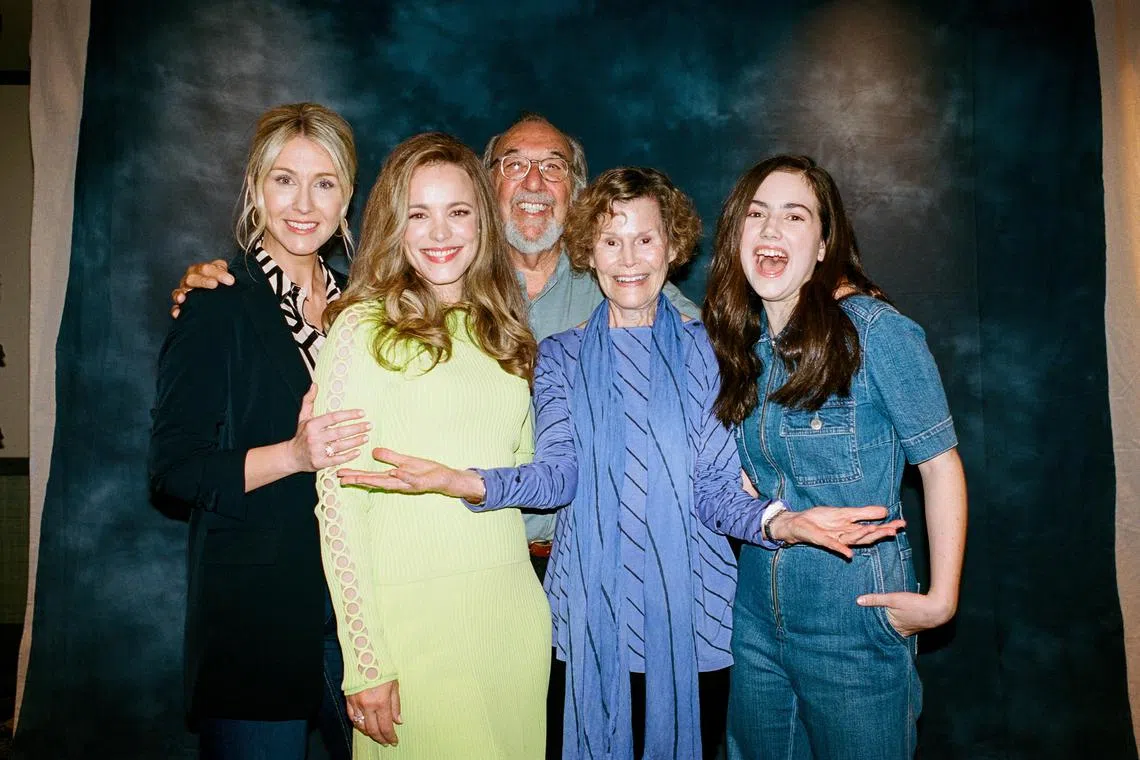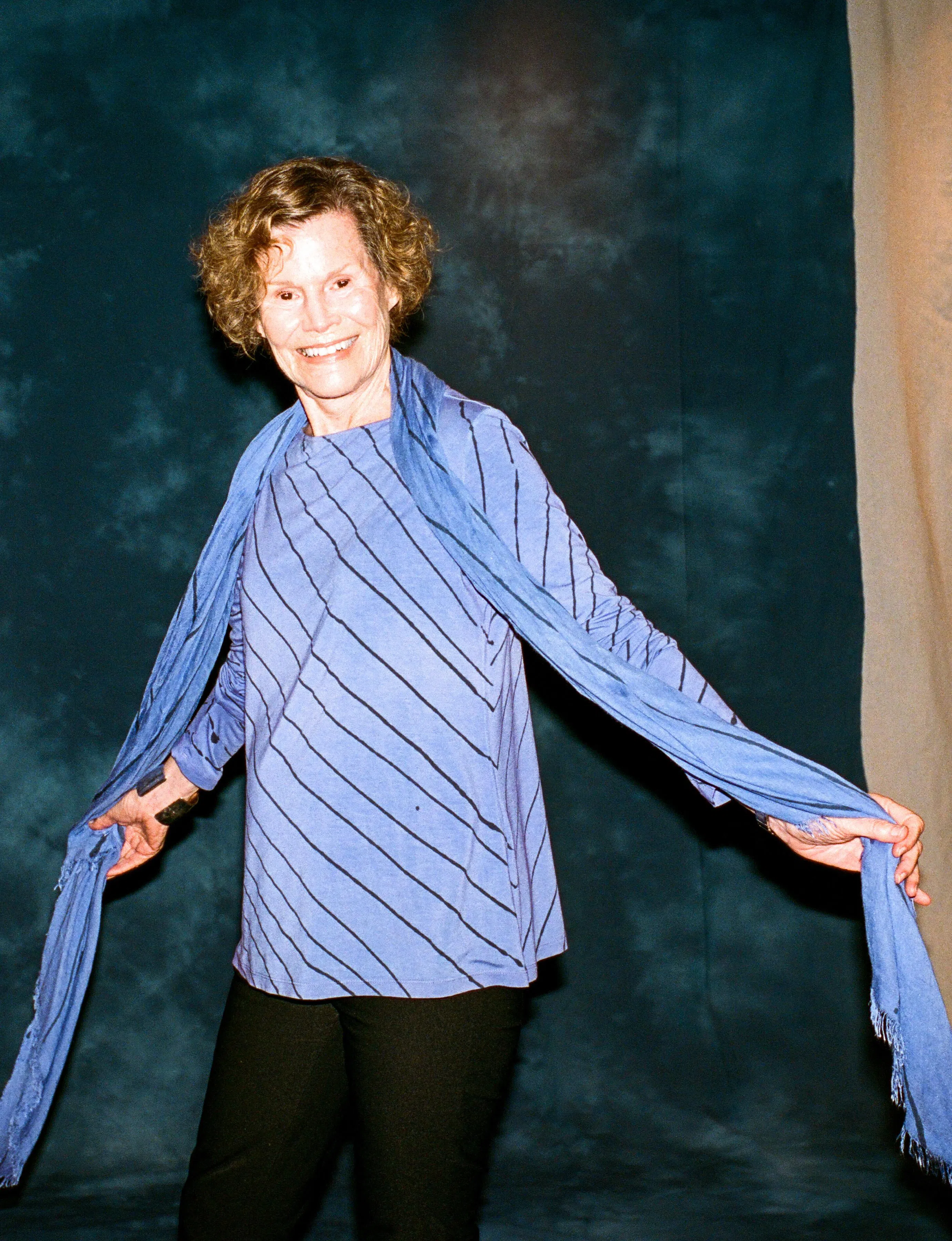Are You There God? It’s Me, Margaret: Beloved, banned and finally adapted
Sign up now: Get ST's newsletters delivered to your inbox

Judy Blume (second from right), with the Are You There God? It's Me, Margaret film-making team.
PHOTO: NYTIMES
Follow topic:
KEY WEST, Florida – There is a moment that has happened millions of times for eons and yet has rarely been captured on film: a 12-year-old girl wondering what to do when she gets her period.
Judy Blume described it in print in her seminal 1970 novel, Are You There God? It’s Me, Margaret.
More than 50 years later, the movie adaptation, due on Friday, is putting that awkward puzzling-through on screen, as young Margaret practises inserting a pad in her underwear.
It is a scene that is so quietly revolutionary, it made the movie’s editor cry when she saw the footage.
There was just this sense, said its writer-director Kelly Fremon Craig, “Oh, my gosh, we have never been allowed to show this.”
Filming it “felt like some sort of release of the shame and embarrassment around it”.
Menstruation, burgeoning sexuality and fraught gender dynamics, religion, the joys and tribulations of girlhood – Are You There God? It’s Me, Margaret tracks them all and has been both banned and beloved for it.
In the popular imagination, the book is mostly concerned with the changing body and the rites of puberty, and that is what made it controversial.
But Margaret’s exploration of religion – her Jewish father and Christian mother encourage her to decide for herself – also drew the ire of the religious right. The God Margaret confides in is non-denominational; as a pre-teen, she has agency and choice.
This 53-year-old story is landing in theatres squarely in the middle of today’s culture wars. The weightier issues it reflects, which had seemingly receded, are back at the forefront: overt anti-Semitism, the widespread curtailing of women’s reproductive rights, and a resurgence of book banning and censorship.
Blume, 85, has been active with the National Coalition Against Censorship for decades. Recently, she felt ready to step back. “Now, I feel I’m going to speak out every chance I get,” she said.
She was speaking in Key West, Florida, where she and her husband George Cooper run an independent non-profit bookstore. Mr Cooper, a retired law professor, also founded an indie movie theatre.
The theatre held a benefit screening of Margaret that drew far-flung Blume fans; lots of colourfully dressed locals; and a front row full of tween girls eager to meet Rachel McAdams, who plays Margaret’s mother.
The movie also stars Abby Ryder Fortson (Transparent, 2014 to 2019) as Margaret and Kathy Bates as her doting Manhattan glamma.
Although the film-makers may hope for multigenerational crowds, the film is not exactly for children. It is for their parents, the Gen Xers and older millennials who grew up with Margaret – “the nostalgia audience”, Blume said.
Partly for their sake, Margaret’s mother got a new, expanded storyline.
“Of any project I’ve done, when I mention this one to people, they just light up,” McAdams said. “They are so ready and excited to share their Judy Blume stories and connections, and how Margaret just changed them, and how grateful they are for it.
“Judy Blume books, you remember where you were when you read them and the feelings you had,” she added. “They’re just something that sticks with you.”
Treating taboo topics matter-of-factly with emotional candour is, of course, what has animated both Blume’s public profile and her writing for children and young adults – a whole generation-spanning oeuvre, with more than 90 million books sold worldwide and a phalanx of devoted fans who tend to get weepy when they meet her.

Judy Blume, author of Are You There God? It’s Me, Margaret.
PHOTO: NYTIMES
Hollywood courted her regularly, but she was protective of her material, and it took a lesser-known film-maker, Fremon Craig, and her Oscar- and Emmy-winning mentor James L. Brooks (Broadcast News, 1987) to unlock the book.
The cultural impact of Margaret is hard to overstate, for inspiring individual readers and future writers and artists, and for detonating traditional ideas about which stories and narrators had value.
A 12-year-old musing about faith and aggressively wishing for bigger boobs changed the canon.
“It is actually a really brave book,” said author Corinne Demas, a professor emeritus at Mount Holyoke College who taught Blume’s work. “She really said, ‘This stuff matters, and these people matter’ – and I think a lot of young girls hadn’t heard that message before, that they mattered.”
Bates had not read Blume’s work before signing on to play Sylvia, the urbane grandmother.
“I didn’t expect her to be so charming, and tiny, but very fashionable and madcap. She’s just delightful,” Bates said. “I wanted Sylvia to thrill her.”
They talked about how to draw out the character; in the book, the adults are mostly ciphers seen through Margaret’s eyes.
Blume, who has a producer credit, was on set for weeks at a time, including the day they filmed the scene with Margaret and her friends chanting the infamous refrain: “We must, we must, we must increase our bust.”
As choreographed by Fremon Craig, the girls were doing the accompanying moves wrong, Blume recalled – more of a prayer-hands squeeze inwards. She whispered the note to a producer and then leapt up to show them how it is done (a stretch outwards, elbows down, chest, of course, projecting).
Margaret is based on some of Blume’s own experiences, including rehearsing what she would need to do when her period arrived. “I practised for a long time, because I was late,” Blume said. “I even pricked my finger to get some blood and put it on the pad, just to see what it would be like.”
Ryder Fortson, daughter of two actors and the sibling of another, filmed it when she was 13, so she was going through some of the same things as her character.
Casting an adolescent meant “I was in a race against puberty”, Fremon Craig noted.
It was “a vulnerable position to be in”, Ryder Fortson, now 15, said. But acting her way through the awkwardness while also experiencing it “made me accept it a little bit more”, she said. NYTIMES

